Pioneers of the dark wave, Psyche is one of the most interesting bands coming from Canada. Getting over all difficulties, they managed to publish eleven records where lies hidden among synths. Darrin Huss accepted to answer our questions without noticing that when your band is called Psyche you can’t expect a normal interview but a psychological test. We will enjoy their music at DarkMad Festival that will take place on the 29th and 30th of April.
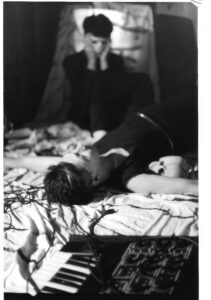 —Your first album from 1985 is called Insomnia Theatre. Is it your Non-Stop Erotic Cabaret? At that time you sounded more like the very first Soft Cell, the one we can see in songs like “The Girl With the Patent Leather Face” and “Memorabilia.”
—Your first album from 1985 is called Insomnia Theatre. Is it your Non-Stop Erotic Cabaret? At that time you sounded more like the very first Soft Cell, the one we can see in songs like “The Girl With the Patent Leather Face” and “Memorabilia.”
—That’s pretty cool, no one ever said that to me, the Soft Cell comparisons, yes, but not specifically both theirs and our debut album. Insomnia Theatre is much darker, though, and there’s no “Tainted Love” on it, but “Brain Collapses” was probably our first “hit” in Europe. Soft Cell, of course, was always my main influence, but there is also Fad Gadget, Gary Numan, Visage, DAF, The Cure, and Bauhaus happening in my world of inspiration at the time.
—I also read that thanks to Skinny Puppy, you changed your style, more industrial, as it can be seen in your compilation Tales from the Darkside from 1990. Anyway, you returned to this sound for the project Vanishing Heat, right?
—You are well informed! Skinny Puppy and Psyche pretty much started this style of music in Canada at the same time, and both bands were approached by Nettwerk Records. As Skinny Puppy ended up being signed and building a following for their style, I realised that I was actually more a singer, and my brother and I wanted to do more with synths than to be trapped in a limited industrial mode. We wanted to develop our Horror Synth sound differently. With Unveiling The Secret recorded in Paris for the New Rose record label, we began to carve out our path advancing forward from the labels of EBM, and Industrial towards our own blend. Vanishing Heat was actually started just for fun as everyone seemed to have to have a side project, and Psyche had just released our Synthpop masterpiece Mystery Hotel, so I felt like fooling around with the kind of music we might’ve made if we stayed industrial. It was an experiment, and I enjoyed it, but I didn’t take it as seriously as I do Psyche.
—Fad Gadget and Soft Cell are clear influences, which other bands were you listening to at the time?
—Also, The Cure, Blancmange, Yazoo, Eurythmics, Joy Division. I was always curious about unique artists that had their own sound like no one else’s. The Doors also were a major influence on Mystery Hotel. We always hated radio-friendly Pop. If it got on the Top 40 then it had to be The Flying Lizards “Money” – a happy accident of chaotic music. I never understood the concept of recording flat out commercial music.
—Could you describe your concerts in the eighties? You were famous for performing nude covered in cream, right? Did you have any problems with law? How was your music received back in the eighties in Canada?
—Well, I covered myself in shaving cream because I saw that Fad Gadget did that at a concert for his song “Lady Shave.” I just decided not to wear underwear. I was well covered, though, until at one show I slipped on the floor! ha ha. I was also inspired by Wendy O. Williams from the Plasmatics, but obviously she had more trouble with her antics being a woman. We were not that famous yet so I figure the alternative audience wouldn’t call the police on us. However, we were banned for 6 months of playing concerts in Edmonton because we showed an artsy horror film at a festival sponsored by our university radio station in there. Several people complained about our film, so we learned early on about the price you may pay for being provocative or controversial. We often were proud of having people leave at our concerts. We felt honoured if they couldn’t take our show. Mainly it was because we were the only synth act in our region. Alberta is like Canada’s Texas. The cowboys didn’t like New Wave or Synth Music. The only people who liked and supported us were also fans of music coming out of the UK like Cabaret Voltaire, and Throbbing Gristle at the time. Also, the French part of Canada, Montréal and Quebec City was more progressive, and that was our springboard to Europe basically.
—Your second album, Unveiling the Secret (1986), is seen as your masterpiece. What can you tell us about the recording?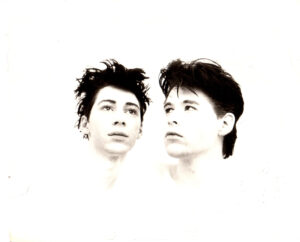
—I think the first 4 albums are each masterpiece for different reasons, but yes Unveiling The Secret set a new standard for what defines the Psyche sound. It has a range of EBM, early Techno, and even a Synthpop ballad all on one album. The album was recorded in Paris at Garage Studio near Père Lachaise Cemetery where Jim Morrison lies. “The Saint Became A Lush” is a combination of our love for Horror film soundtracks, and me doing my best Ian Curtis style vocal reciting a poem over this epic story of Lovecraftian magnitude. Most of the songs including that one had actually been performed live before we even got in the studio. “Black Panther” was very popular as well. “Unveiling The Secret” was actually written while we were in Paris and was the first new song of that period in the studio. I had to record my lyrics in one take because it was the last day before the budget from New Rose Records allowed before the mix down!
—You said that “The Saint Became a Lush” sounds a bit like “Tubular Bells”. Did you like prog rock? Some of those bands were pioneers in the use of synths. And do you like “The Secret”, the tune that took inspiration in yours, made by Joris Voorn?
—The only prog rock we were aware of at the time was Goblin because of the Dario Argento film soundtracks. Unless you also consider Tangerine Dream and The Doors in that category although I wouldn’t. We weren’t into things like Yes, or Genesis, so the “Tubular Bells” comparison comes from being inspired by the theme in The Exorcist which just so happens to be an excerpt from Mike Oldfield’s famous track. It’s not quite the same notes, though, but I know my brother really liked the sequence. Joris Voorn was kind enough to write to me and inform me of making, “The Secret.” To be honest, if I wasn’t asked, I may never have known about it, as that is a music scene from another planet as far as I’m concerned. Even though I once did a remix for Richie Hawtin’s Plastikman – “I Don’t Know” (Psyche’s Haunted Whisper Remix Featuring Darrin Huss) but these artists are famous in a whole different scene. I’m just glad they found something inspiring from my music.
—One thing that puzzles me is that although your music still sounds very modern, a lot of the relatively new bands making EBM and synth pop sound more eighties or early nineties than you. Like you tried to do something different, but these bands just want to recreate that sound. Do you agree?
—Well, I didn’t want to say this, but you did! Our goal has always been to further develop what synthesiser music has to offer. Even so, I have to tell you, when we first made the song “Sanctuary” that brought us into a new scene of Cyber Goth, and Techno Body Music was beginning to infiltrate the scene as the 90s were ending, I was told that even that sounds “too 80s” by a label we offered it to. If they only knew we’d have artists such as Lebanon Hannover, and Boy Harsher almost 20 years later! To be honest, I prefer the “new” groups to the Ibiza EBM trend I had to live through in the 2000s. My only problem is that I still believe electronic music needs to grow and bring more surprises than just rehashing all the classic sounds. Still, I won’t deny loving certain synths like the Korg Mono/Poly or all those early drum machine handclaps. Certain sounds still automatically seem more exciting to me than others, so the more people that use sounds I like, the better the company, ha ha.
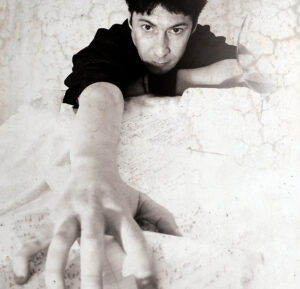 —You moved into more synthpop with Mystery Hotel (1988) . What were you thinking at the time that led you to make this change?
—You moved into more synthpop with Mystery Hotel (1988) . What were you thinking at the time that led you to make this change?
—It was a natural progression as we were just continuing to develop our sound and didn’t want to just repeat what we’d done. All the artists I really admire such as Blondie, The Doors, Soft Cell, Eurythmics, Fad Gadget, Grace Jones, and Soft Cell showed me that you could be innovative with your music and yet still be you. If the vocalist was recognisable and the music didn’t suddenly become another genre completely, you still have your sound. Some have said we “changed too drastically”, but we thought we were just developing our repertoire and defining our own boundaries really. Mystery Hotel had everything, synth funk, psychedelic, dark wave, synth pop, and even the unlikely pop song “Eternal,” but it was all still pure Psyche style. Just like any album of The Doors. You know it’s them, whether it’s “Light My Fire” or “The End.” It’s about the range that you bring while still defining your own sound.
—Although it’s not part of the initial three records The Influence (1989) (that should have been called The Influencer), was another important record. Was the darker mood of the album a reflection of your life at the moment?
—Yes, and ironically after all I said about different styles on one album, The Influence comes much closer to one unit of sound overall. This was the first album I made without my brother after he was diagnosed with schizophrenia, and I was having trouble deciding what to do about making a future with Psyche. The whole album was made with just the Casio FZ1 sampler by David Kristian. Even though there are some normal sounding bass synth sounds on the record, all of it was created by him. That’s what I am always looking for. I always say that I feel like Psyche is a science experiment, as life is in a way. I want new experiences, I want to hear different things that surprise me. It was a moment of luck and courage to make such an album. The freedom to not know where your next paycheck is coming from, but believing in your art. The album is dark because even though I was only 24 at the time, I felt like an old man who’d already experienced a lot of pain and sorrow in life, and I was reflecting on all of it. When it was finished, I actually felt a little nausea at first hearing it entirely. “The Sundial,” made me cry. It’s a very emotional album, and yet that’s why it actually reached a lot of people. I am glad Psyche’s music makes people feel something. That’s all I ever wanted. Loud radio pop just isn’t my business.
—Was it difficult to continue without your brother?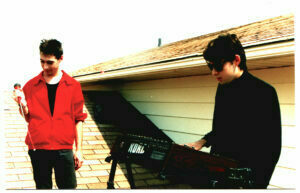
—I’m assuming you mean after his passing? I had already continued Psyche after his last involvement from 1995 to 2005 so I’ve had his blessing, and his influence is always there no matter who I work with. Performing live right after he died was very difficult, and it did stop me from wanting to write new music for a while as I preferred performing the older Psyche songs to promote the re-releases of the first 3 albums which I mastered myself with added special tracks, and pictures from our archives. Also, when I decided to relocate to Germany in 1994 after we made the Intimacy album I hesitated to have a new member in his place until Per-Anders and I met, and started writing for Strange Romance. Stephen said it was OK to continue, and I always asked him about the music I created. It’s certainly not easy when you are a duo, and people want to see the original band members on tour 30 years later or whatever, but like many things with Psyche’s unplanned “career,” it just continues because it’s the life I chose to live, and it’s what I do. 11 albums so far is pretty good considering I never really compromised what makes Psyche unique. I owe that to Stephen’s original creativity.
—How did your gear change from the first albums to now?
—We don’t have all the old synths that we used, but thanks to new music programs on the computer, we actually are able to use the sounds of the Korg Mono/Poly and some of our favourite early drum machine samples. The first 3 albums were mainly done with the same synths we had begun collecting, and on Mystery Hotel the dreaded Yamaha DX7 joined in as well as a few things such as the Fairlight which was all in the Dan Lacksman (Telex) studio for that session. In the 90s I recorded with Per-Anders Kurenbach and he had a mix of more digital instruments, and plug-ins. However, we also used some things like a Djembé, Harmonica, and the occasional acoustic effects. For the period of music between 2001 and 2005 with Remi Szyszka we had mainly computer programming through a midi-control synth, and the dreaded Virus.
—I saw your music described as horror electronic, do you enjoy horror movies or literature? I read that some of your songs were inspired by different books and movies.
—In the beginning we were mainly inspired by Horror. The atmosphere and music of the films by George Romero, John Carpenter, David Cronenberg, Dario Argento, and Lucio Fulci. I was reading a lot of H.P. Lovecraft, “The Saint Became A Lush” was inspired by The Case Of Charles Dexter Ward, and “The Outsider” by the short story of the same name. We even dedicated the Unveiling The Secret album to Lovecraft and Cronenberg. Stephen was very inspired by all the 70s and 80s horror stuff. I prefer the atmosphere of the supernatural elements as opposed to straight ahead slashers. Other authors such as Ramsey Campbell inspired my song “Nocturnal Passenger,” and “The Influence.” Then there’s Shirley Jackson who inspired “The Sundial” and “Haunted.” We’re also all indebted to the imagination of Stephen King as well.
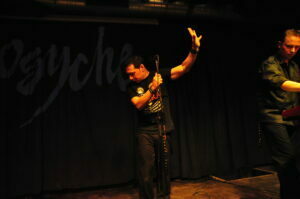 —After your more famous records, we have Daydream Avenue from 1991 and Intimacy from 1994. How would you recommend these records to someone who listened only until The Influence?
—After your more famous records, we have Daydream Avenue from 1991 and Intimacy from 1994. How would you recommend these records to someone who listened only until The Influence?
—Well, Intimacy has some elements of The Influence style such as “Broken Heart” and “Love Is A Winter,” but it’s a little weirder because there are elements of lounge and chill out styles mixed with horror themes such as “Freaks!” It’s like a strange sequel made by my brother as opposed to The Influence made by David Kristian. I am very fond of “Blind,” and “The Cathedral” as well. Daydream Avenue has a few highlights, especially “Angel Lies Sleeping” which was a hybrid of Ministry’s Twitch album sound, and the more pop side of techno just developing at the beginning of the 90s. As always in between the experimenting with various styles of dance music, there are the dark melancholic songs such as “Ghost” and “Destiny.” This is why I say because of my lyrics and vocal style, it still ends up sounding like Psyche even if some of the instrumentation changes. Even the strange hip-hop electro sound on “What Sorrow Cannot Say” doesn’t take away from the sombre tone of the song itself.
—In Strange Romance (1996), you include your version of “Goodbye Horses” that was a success. How did you choose to make this song?
—This is a rather strange accident in that there was a guy who wanted to manage Psyche at the time. Per-Anders Kurenbach and I had just started making demos, and it was suggested that this song would give us a good starting point. When I saw the Silence Of The Lambs movie, I also thought “Goodbye Horses” sounded a bit like Psyche somehow, although I was then busy recording the song “Heaven In Pain” as a solo track that I thought would be a hit. Instead it ended up on Intimacy, and suddenly it’s 1995 and I’d forgotten about “Goodbye Horses” until this guy reminded me. Per-Anders and I had a copy of the 7” single to study, and I decided to sing it as if it was written by us, and the music was made to sound more like it does in the film. Echoing through the hallways of the basement. We put it on the “B-Side” of our “You Ran Away” single, but it ended up being such a massive success in all the goth clubs in Europe, so, of course, it had to be on the album. I actually got the lyrics wrong and sang “Lying over you” instead of “Flying,” but as the internet had just begun around this time, my version of the text was on all those lyric sites that came up. I eventually corrected this after I received an email from William Garvey, the songwriter telling me what the song was about and how he created it. The rerecording I did 10 years later is now the most popular Psyche track on the streaming services. Many people think it’s our version in the movie, and we decline to correct them, but if you play ours and the original back to back you can really hear the difference. Recently more people have started covering it, but I still consider us to be the main ambassadors of the song. Of course now you can even see the video for the original Q Lazzarus recording on YouTube. I made a playlist called “All The Goodbye Horses” with about 40 different versions on my Psyche Channel. Subscribe, and enjoy!
—I was a big fan of Drum’n bass back in the late nineties. How did you include this sound in Love Among the Ruined (1998)? Also, do I hear a bit of Nine Inch Nails?
—That was Per-Anders. With Psyche, we tend to absorb what’s happening in electronic music and try to filter it through our style. Love Among The Ruined has influence from NIN, Björk even a little bit from The Prodigy, but it’s still our own take, and includes the usual Melancholy, and Synthpop songwriting we are known for. My favourite song on that album is “Exhale” because it was a mixture of experimental electronics, blues, and drum & bass all mixed together to create something new.
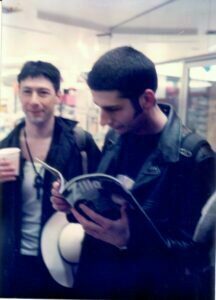 —How did working with Remi Szyszka changed Psyche? He first worked with you on Sanctuary, was it difficult to have another musician onboard?
—How did working with Remi Szyszka changed Psyche? He first worked with you on Sanctuary, was it difficult to have another musician onboard?
—I’m attempting to avoid talking about the line-up changes with Psyche these days as I don’t like to put too much weight on the outcome of what makes the Psyche sound specific. Madonna works with many different people, but she is still Madonna. Also, sometimes things change that are not on purpose. They may happen for personal reasons or whatever. Remi came at exactly the right time, and “Sanctuary” actually created what they call a reboot for movies, but for Psyche in music. The albums The Hiding Place and Babylon Deluxe are what needed to happen in the 21st century, and so I’ve been very lucky to create all these new songs within the realm of Psyche with musicians who each developed additions to the sound as it continues to grow its own unique library. I’m very choosy, so unless I feel we are within the right vibe I usually won’t record. The song “Looking Glass” was Remi’s idea of what makes a typical Psyche song.
—In Endangered Species (2002) for example, we can find some remixes. Do you like to remix yourself? How do you feel when you hear someone’s remix of one of your songs?
—I have a love/hate relationship with remixes. I prefer extended mixes of the basic foundation as it was done in the 80s. Occasionally, however, a remix completely recreates the song to the point that something new comes out of it. Those can be really cool. Not too fond of ones that just try to add a different dance beat that I normally wouldn’t approve of in the first place. That’s why we like to remix ourselves. I tried the experiment of different versions for the 20th anniversary of Unveiling The Secret in 2006 with the Unveiling The Secret 2.0 release. On that one I loved the Christian Piotrowski mix so much I added it to some compilations, and even performed that version live a few times. Still, some songs are so powerful in their original, there’s almost no point in changing it. “The Saint Became A Lush” in the Radical G mix is rather exciting, though, I think it takes all the great elements of the original, but makes an alternative version, also more like a reboot than a remix. It’s like doing the song all over again, keeping the atmosphere and style, but recorded with a different vision. A parallel universe version.
—How aware are you of the music of the moment when you make a record? Would you say that in Babylon Deluxe (2003) is a product of its time?
—Not really, only the song “Sanctuary” was truly a product of its time, but Babylon Deluxe is a mixed bag of sounds with some that were popular on the scene, such as the techno sequence in the middle of “Gods And Monsters,” but with many very strong Psyche song classics such as “The Quickening” and “Equinoxe.” Also “Snow Garden” was not inspired by anything happening in the “noughties.” We had actually started moving our own way forward by 2003. I think the whole album is brilliant with the exception of “Final Destination,” and “Nobody Superstar” although the lyrics still hold true.
—Could we say that Brave New Waves Session (A Brave New Waves Session with music from Psyche was released in 2018) is a kind of Canadian Peel Sessions? What’s the period represented there?
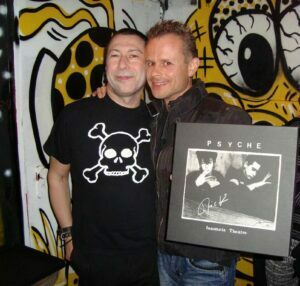 —Yes, Brave New Waves was a big deal in Canada, and helped inspire many a musician by bringing us alternative music from all over the world. It’s the first place I heard Anne Clark, early Ministry, Tuxedomoon, and the like. Once again Psyche’s trajectory has never been streamlined with a plan and as it happened, the session is more like a lost moment in time. My brother had just performed with me live in Montréal for the last time. Since his diagnosis of schizophrenia, it had become too distressing for him to perform. We had a third member Eric Klaver who performed two more shows with me after my brother went home. Unfortunately, this also was in the time that we had received the chance to do this special radio recording session. Other than “Unveiling The Secret” all the songs were written and improvised by Eric Klaver, and myself, with additional help from Kevin Komoda (Rational Youth). So, it’s even beyond a John Peel Session where the songs are also usually on albums before and after. In this case what you hear on “Brave New Waves” was only recorded for that session, and shows once again a range of ideas representing a spontaneous intermezzo in the Psyche repertoire.
—Yes, Brave New Waves was a big deal in Canada, and helped inspire many a musician by bringing us alternative music from all over the world. It’s the first place I heard Anne Clark, early Ministry, Tuxedomoon, and the like. Once again Psyche’s trajectory has never been streamlined with a plan and as it happened, the session is more like a lost moment in time. My brother had just performed with me live in Montréal for the last time. Since his diagnosis of schizophrenia, it had become too distressing for him to perform. We had a third member Eric Klaver who performed two more shows with me after my brother went home. Unfortunately, this also was in the time that we had received the chance to do this special radio recording session. Other than “Unveiling The Secret” all the songs were written and improvised by Eric Klaver, and myself, with additional help from Kevin Komoda (Rational Youth). So, it’s even beyond a John Peel Session where the songs are also usually on albums before and after. In this case what you hear on “Brave New Waves” was only recorded for that session, and shows once again a range of ideas representing a spontaneous intermezzo in the Psyche repertoire.
—The 11th Hour (2005) is your last record so far. We haven’t spoken yet about your lyrics, how do you write them? Do you think this album is special in that sense?
—Well, I mentioned my lyrics to some of my favourite songs in the other questions. I think The 11th Hour is extremely prophetic as I was writing from a very dark place about everything coming to an end. It’s about getting older, not belonging, watching the world dying, feeling cursed, and trying to find an acceptance of the situation in order to keep going. I don’t know if the lyrics are more special than the others, though. I think the title “Bloodcurse,” and “September Moon” are pretty cool, but my favourite lyrics are spread out over all the Psyche albums. I love my lyrics to “The Hiding Place” title song just as much as “The Outsider” or “The Saint Became A Lush.” In the early days, I was inspired by stories I was reading, and some social issues. The middle period of my lyrics became more personal experiences, and some romantic themes. Later there has been an addition to how humanity is dealing with technological advances, and the kind of world problems we are facing.
—In 2018, you released the “Ghost of the Past” with the German band NO MORE. What can you please tell us of this collaboration?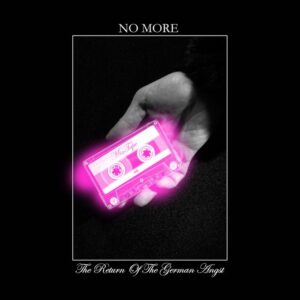
—One day in 2009, we were invited to play at a festival organized by NO MORE in Kiel and became friends with Andy and Tina.
Since that time, we have often toured together, and enjoy each other’s musical creativity very much so that we decided to have a collaboration session together in early 2011. We created a few songs, and they later released one of them, “Desperate Living” on their Return Of German Angst EP.
As that song seems to suit them well and had Andy as lead vocalist, I decided that our song together “Ghosts of The Past” should also be released as Psyche featuring NO MORE because it combined the best of both our styles, but with my lead vocal. I like to have special releases for Halloween every year, and this one suited the mood of the time. My release preceded their track by 2 years even though all of them were recorded in 2011.
—You also made the soundtrack for Stenches. How was the experience?
—This was a special request by the film maker Rob Barriales after he made our video for our first new song in ages called “Youth of Tomorrow”.
My brother and I always wanted to do soundtracks, but unfortunately it took until long after Stephen’s passing away that we had an opportunity to make some music for a borrow film. It’s only a 16-minute short, but we recreated some Psyche tracks, added new music and even some instrumentals from Stephen to the score. Stefan Rabura created the “Stenches Theme”. it was an accident as it was originally a new Psyche concert opening track that became the perfect fit for the film!
—Can you please tell us more about Imaginary Life? It’s an album created by putting together Endangered Species and The Hiding Place, right?
—Yes, it was an exclusive Bandcamp release that I made as I wanted to remaster all the songs that I liked from those releases and make kind of a new album to represent that period of Psyche. I haven’t added it to streaming services yet but may do so for this year’s Halloween.
—Spirits of Lockdown was your last EP of new material with five covers. How did you choose the songs?
—I have wanted to do “Cry Little Sister” for the last 20 years, and made a demo in 2006, but was never confident enough until I decided to once again have a special release for Halloween. Then because of COVID-19 and the lockdowns I thought it would be fun to just put together a few songs I have loved forever, and make a little digital EP to represent these moods. I have always wanted to make an electro punk version of “Living In The Real World” from Blondie, so I did that, and also wanted to do “Just One Kiss” from The Cure in the full 12” version as I absolutely love that song, and have it on my mind ever since I first heard it. I was fairly proud of it, so that song and “Security” by Men Without Hats became the streaming single while the other covers just stay exclusive to Bandcamp. “Security” is another one that I just felt fit exactly in our modern times of surveillance, hacking and also the fears that people had about lockdowns etc.
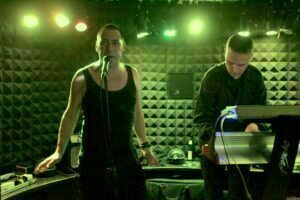 —What can you tell us of Psyche Enterprises? How is it going? You have also released some solo albums and your brother post-albums, any recommendations?
—What can you tell us of Psyche Enterprises? How is it going? You have also released some solo albums and your brother post-albums, any recommendations?
—It’s just a made-up label for my digital distribution to cover any work by Psyche-related creations. Just to have the family legacy in place. I’m not signing anyone.
—You have released two of your albums on vinyl using a Pledge campaign. How was the experience? Are you planning to do something similar in the future?
—I did. Intimacy because it was never on vinyl and wanted to finally try the campaign avenue. I wasn’t really interested in the idea of fans pledging to create an album until I realized that it might be a nice idea for a rerelease that was actually requested by our fans, and Intimacy was the best choice for this to take this opportunity. I like the way Bandcamp works and it was great to be able to make a whole new concept for this special Psyche album. I wasn’t sure if I would continue as normally the next choice would also have been an album of the 90s that also had never been on vinyl. However, I chose The Influence as it gave me the chance to add the better version of “The Sundial” that was only a bonus track on the CD version at the time. Also, it is considered a definitive milestone in the dark wave scene. It would have been the logical step to release it as the 4th album of our 80s period, so I went for it.
—Two years ago, Artificial Dance released Galaxy, a compilation of tracks from your brother Stephen back catalogue. You were involved in the selection of songs. What can you please tell us about this release? It was quite popular among my electro-lover friends. Can we expect more reissues in the future?
—This album became possible because Artificial Dance chose a previously unreleased instrumental called “Infinity Sign” by my brother for their second compilation. After that it was their idea to make an album of Stephen’s work, and we compiled the choices together. I absolutely love this release as it also contains tracks that were previously only on CD or cassette as well as some cool choices from the label. I do Hope I’ll get an opportunity to make a follow up.
—When are we going to have the long-promised new album? And the acoustic one?
—I think by the time I’m ready it may have to be a double album to cover these options, but I can only do this when I’m confident of the new songs and can’t wait to play them live. Sometimes life just happens, and I ended up just making singles, and small musical statements rather than a complete album.
—What can we expect of you concert at DarkMad? It’s quite curious that in the previous interview you said that you were excited because you were going to play on the same stage as Lene Lovich and The Human League and it’s going to happen again.
—We are doing a strong 80s oriented show. Mostly our classics, and a few new surprises may also be in store. Oh yes, and we are huge fans of Lene Lovich. Truly one of the most unique artists and performers on the planet.
[vc_row][vc_column][vc_video link=”https://www.youtube.com/watch?v=F2Uv6dajfhI&feature=youtu.be” el_width=”70″ align=”center” css_animation=”fadeIn”][/vc_column][/vc_row][vc_row][vc_column][vc_video link=”https://www.youtube.com/watch?v=8nZmP-uMKDU&feature=youtu.be” el_width=”70″ align=”center” css_animation=”fadeIn”][/vc_column][/vc_row]





1 comment
Great read! Very informative. Darrin is a great guy.